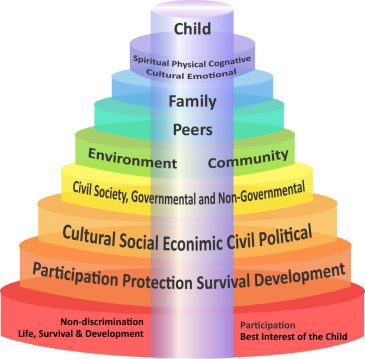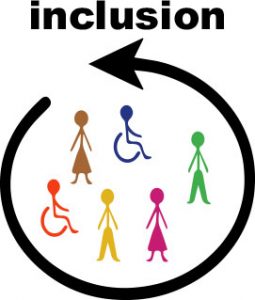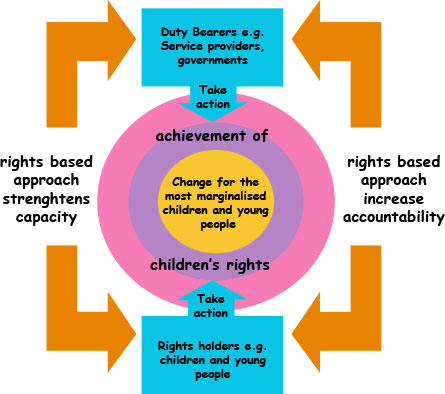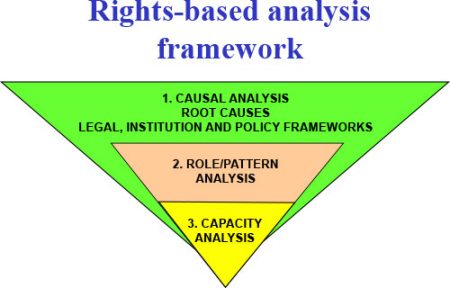In promoting and protecting the rights of children there are several perspectives that ought to guide initiatives that are rights based and offer the best circumstances for the full realization of the rights of children. These underline the work of the NCFC and guides the advocacy efforts of the organization.
A Child-centered Approach to Development
The NCFC emphasizes the need for a child-centered approach to development because it puts the child at the center of development planning. Research has shown that children are key yardstick for measuring national development. Children are the starting point for breaking cycles of poverty. The effects of poverty are most extreme on children causing lifelong damage to their minds and bodies and ultimately their potential. Because children bear the disproportionate burden of poverty a child-centered approach is essential to breaking these cycles of denial that restricts children’s capabilities and potential. It requires that those in decision-making positions act based on the best interest of the children and that those concerns guide the development and implementation of policies and the allocation of budgetary resources.

Ecological Perspective
The Ecological perspective provides a sound framework for a holistic and comprehensive provision of the rights of children. It ask duty bearers to look across the lifespan of the child and to note the various vulnerabilities present at different times and to provide key interventions to mitigate the impact of those vulnerabilities on the lives of children.
Investments in Children
It is often the perception that social sector initiatives and by extensions initiatives focusing on improving the lives of children and their families imply that the State has to spend money that it does not make a return on. The NCFC challenges this perception and advocates for the requisite resources to support these initiatives as investments rather than expenditures. The concept is that if we “invest” the resources necessary to build protective environments the State would spend less money on “fixing” problems that could essentially been avoided. If we focus our energies on providing response to issues rather than creating a different reality we undoubtedly incur a heavier cost. Hence the NCFC advocates for investments that increase the opportunities for full realization of the rights of children.

Equity/Social Inclusion
It is imperative that the work that is done for children takes into consideration what is called the Equity principle. Equity is based on the idea of moral equality, the principle that, despite many differences, all people share a common humanity or human dignity and should be treated as equals. This is not the same as treating people equally, rather, it is the idea that all count in the moral calculus. Two standards for actions to be morally justifiable:
- Relevance: “I gave her some food because she was hungry not because she was wearing a white shirt”;
- Consistency : giving food to one person because of their hunger and also to the next person who is equally hungry
The Three Equity Principles
- Equal life chances: there should be no differences in outcome based on factors for which people cannot be held responsible;
- Equal concern for peoples rights & needs: some goods/services are matters of necessity and should be distributed proportional to peoples level of need and nothing else;
- Meritocracy: positions in society and rewards should be distributed to reflect differences in effort and ability, based on fair competition

Human Rights Based Approach to Planning
Human Rights, if they are to be meaningful, ought to be translated into practise and allow for each citizen to experience the fulfillment of their rights. The Human Rights Based Approach to Planning (HRBA) speaks to the set of guiding principles that must be woven into program planning. There is no definite definition on what it is but there is a common understanding:
- All programmes of development cooperation, policies and technical assistance should further the realisation of human rights as laid down in the Universal Declaration of Human Rights and other international human rights instruments. (UN, May 2003)
- Human rights standards contained in, the principles derived from, the Universal Declaration of Human Rights and other international human rights instruments guide all development cooperation and programming in all sectors and in all phases of the programming process. (UN, May 2003)
- Development cooperation contributes to the development of capacities of ‘duty-bearers’ to meet their obligations and/or ‘rights-holders’ to claim their rights. (UN, May 2003)
Essential Characteristics Includes
- Programming is informed by the recommendations of international human rights monitoring mechanisms.
- Situation (Causal) Analysis to identify immediate, underlying and basic causes of the non-realization of human rights.
- Identification of key claim-holder/duty-bearer relationship on all levels of society (Role Pattern Analysis)
- Assessment and analysis of the capacity gaps of claim-holders to be able to claim their rights and of duty-bearers to be able to meet their obligations. (Capacity Analysis).
- Monitoring and evaluation of both outcome and process guided by the HR standards and principles.

